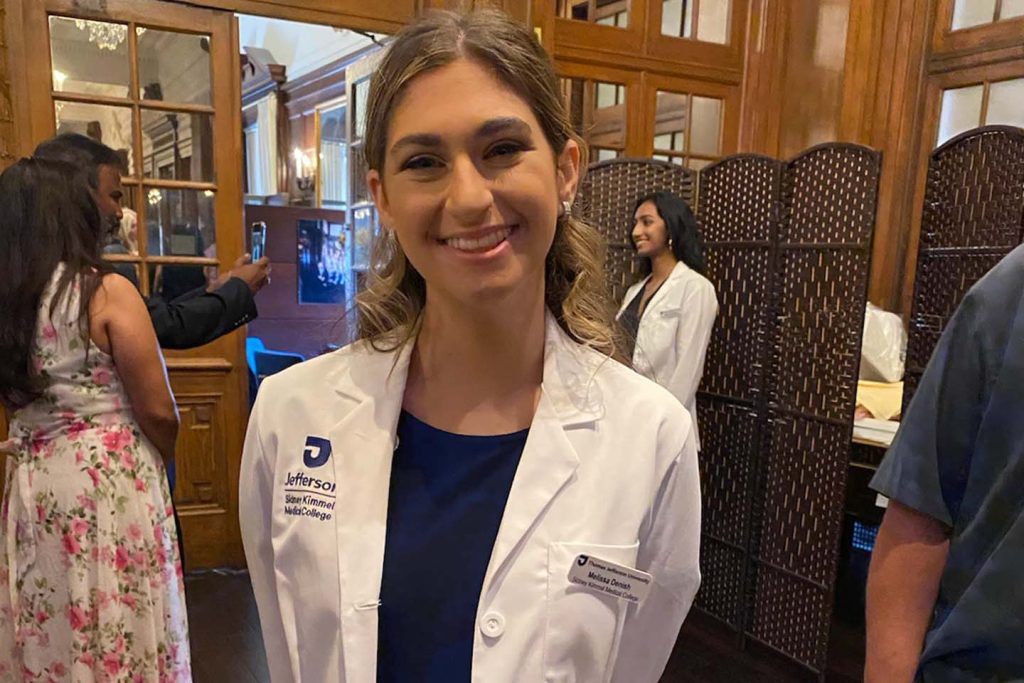Biochemistry Major
Back to Majors, Minors & Academic Programs
About the Major
Biochemistry studies the processes that occur at the molecular level in living organisms. Students with this major receive an in-depth, interdisciplinary foundation in chemistry and biology — lessons needed to understand those processes. Graduates completing this major will be prepared for careers in the biotechnology industry or graduate studies in biochemistry, pharmaceutical chemistry, molecular biology or medically related fields.
Jobs in Biochemistry
- Academic research technician
- Research associate in pharmaceutical, biotech or other chemistry-related companies
- Quality-control technician or associate
- Scientific writer
- Pharmacist
Past Elon Biochemistry Internships
- University of North Carolina Chapel Hill School of Medicine
- National Institutes of Health, National Cancer Institute
- LabCorp
- Syngenta
- KBI Biopharma
Related Majors
Lumen Prize-winning research project inspired biochemistry student to pursue medical field

Melissa Denish graduated magna cum laude from Elon. She was a Lumen Scholar and a member of the Phi Lambda Upsilon chemistry honors society. But even Denish had difficulties with organic chemistry — and before graduating, she encouraged new students to be unafraid of asking for help if they needed it.
“I wish I had known that it is OK to fail, and it is OK to ask for help when and if you need it,” Denish said shortly before graduating in 2022. “When I took organic chemistry, I struggled a lot. I am grateful that I did not let that experience deter me from continuing my major or from applying to medical school.”
Today, Denish is enrolled in Thomas Jefferson University’s Sidney Kimmel Medical School as she plans a career in neurology.
The Lumen Prize solidified my interest in research and contributed to my desire to become a physician. This program gave me a cohort of amazing research students in all fields to learn from.
She chose a major in biochemistry because of a high school mentor who encouraged her fascination with both biological and chemical sciences. At Elon, she was a teaching and learning assistant for general chemistry labs beginning her sophomore year and continued in that role through her senior year, working alongside numerous chemistry faculty.
Her Lumen Prize-winning research project — “Investigating the Molecular Basis of Tay-Sachs Disease” — consisted of modeling the fatal neurodegenerative disease in a laboratory setting.
“I selected this topic because it combined two large parts of my identity: science and my Jewish identity,” Denish said. “TSD is more prevalent in the Ashkenazi Jewish population. I was excited to partake in a research project that was important to me on a personal and professional level.”
She considers winning the Lumen Prize one of the moments that defined her college career.
“The Lumen Prize solidified my interest in research and contributed to my desire to become a physician,” Denish said. “This program gave me a cohort of amazing research students in all fields to learn from.”
Did You Know?
- Elon’s biochemistry major has a near-100 percent acceptance rate to graduate programs in biochemistry, environmental engineering, neuroscience and other related fields.
- Students who major in biochemistry have access to state-of-the-art technology and are able to put their knowledge into practice through internships and/or undergraduate research.
- Elon has one of the highest rates of participation in undergraduate research: Approximately 95 percent of all biochemistry majors do independent research. Also, the largest percentage of Lumen Prize winners come from the chemistry department.

